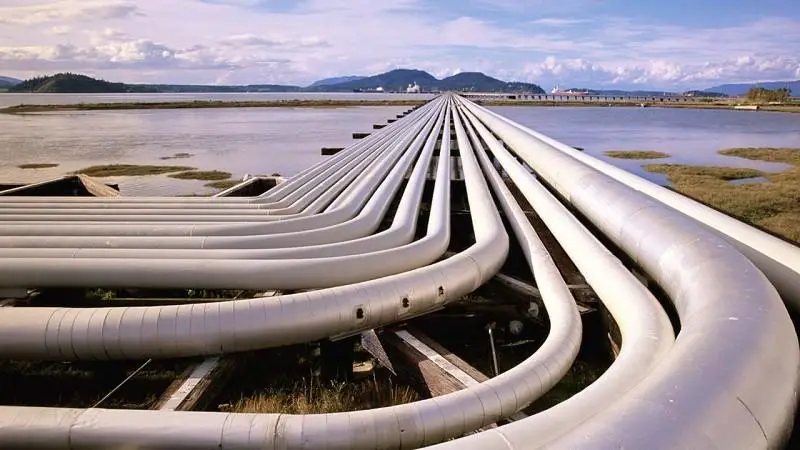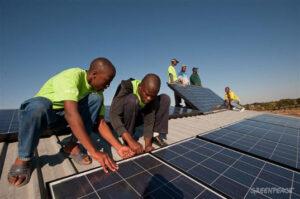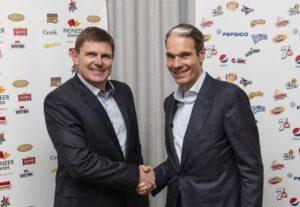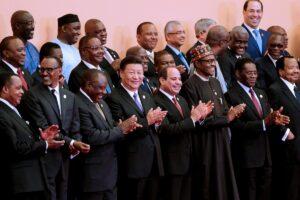- Africa’s new dawn: the rising role of digital and AI in agriculture
- Can Dangote Refinery Transform Africa Energy Ambition
- Gallup Survey: 80 per cent of Kenyan Workers Are Disengaged and Seek New Opportunities
- Madagascar Man Freed from 5KG Tumor After 15-Year Struggle
- How women in Africa are perceived and treated
- Sugar consumption in Kenya to Increase to 1.23 Million Tonnes
- Can Somalia and Turkey Oil deal Bring Change in Somaliland
- Remittances to Kenya dropped to $371.6 million in June, marking a six month low
Manufacturing
Africa has been hailed as the next frontier in the provision of global oil and natural gas resources, especially now in the wake of the ongoing Russia-Ukraine war.
This crisis has not only altered the global energy landscape, but also instigated an inflation in gas prices, given the former’s position in the hierarchy of major global producers. As sanctions continue to soar, Europe has embarked on a quest to find contingency energy supplies, as it seeks to minimize its dependency on Russia; which has already cut off gas supplies to countries like Finland, Poland and Bulgaria, over energy payment disputes.
Consequently, Africa’s gas resources have gained a newly found prominence, pertinently by the European Union (EU); owing to the continent’s rich endowment of oil and deep gas reserves. The mounting global demand for gas, has been pushing international energy companies to reconsider African projects. The numerous ongoing and upcoming oil …
However, all efforts have been directed in that sector to try and make it greener and cleaner. Among consumers, a major shift is now being witnessed with most of the industries investing in clean energy sources that are both affordable and sustainable.
Such initiatives have made Kenya be rated among the top countries that are implementing their nationally determined contributions that seek to cut greenhouse gas emissions in the country by 32 per cent by 2030.
The latest industry to have made noted efforts to transit to clean Energy is Bamburi Cement Factory situated in Bamburi Mombasa.…
- Varun Beverages has become one of the country’s biggest beverage firms in Zimbabwe
- Delta has had a firm grip on the Zimbabwean drinks market and is home to international brands of soft drinks and beers
- Varun is on an aggressive urban assault to capture more market share and challenge the drinks giant.
Varun Beverages has become one of the country’s bigger soft drinks firms in Zimbabwe within a relatively short period.
Bottlers of Pepsi, 7up and Mirinda brands, Varun has established itself as one of the soft drinks companies to reckon with in the soft drinks market.
This is an impressive achievement given it is going toe-to-toe with long-established Delta, Zimbabwe’s most prominent beverage firm with big brands such as Coca-Cola, Fanta and Sprite.
Since the colonial era, Delta has had a firm grip on the Zimbabwean drinks market and is home to international brands of soft …
Increased competition between Simba cement and Kampala cement is driving prices down in Uganda.
A 50-kilogramme bag now retails at an average price of $7.5 from $10.8 with some brands charging even lower.
Before the entry of Simba cement and Kampala cement, Hima Cement and Tororo Cement have been the dominant market players in Uganda.
The drop in prices has been long coming following last year’s drastic measures by Uganda’s Ministry of Trade, Industry and Co-operatives to fast track licensing of new cement manufacturers. The removal of 10 per cent import duty on clinker has also lowered production costs.
Some cement manufacturers rely on clinker as a raw material in their production while Tororo and Hima rely on pozzolana as their raw material which is mined in Kasese and Tororo.
The government of Uganda had threatened to allow imported cement to come into the country on a special …
Sub-Saharan African clothing and footwear market is worth $31 billion US dollars and growing. In a series of articles about the industry in Sub Sahara Africa, we will explore the policies, trade and the budding creative fashion industry in the region.
The African Fashion catchment
Africa drink, eat, and sleep fashion. The diversity of the culture of this huge continent ensures its almost 1.3 billion inhabitants wear or dream to wear certain clothing and apparel. With the population of the continent becoming younger by the day, the demand for fashion that sends a message and identity of an individual is becoming more relevant.
This diversity comes with its strengths and challenges. West Africa has a rich African infused fashion while East and Southern Africa has western influenced fashion and manner of dressing. Most of Northern Africa has a fashion industry dictated by middle eastern and Islamic culture.
Fashion is big …
By Giza Mdoe
Wide angle AI Triple Camera
You have not experienced the wonders of a smartphone until you experience the Phantom 9.We are not just talking of the usual fingerprint in-display sensors,motion sensing and screen rotating gyroscope, we are going the extra mile and introducing Artificial Intelligence Triple Cameras complete with auto sensors and a wide angle photography capability.
The AI Triple Camera (16MP+2MP+8MP) has one camera in the front for your amazing never to miss selfie moments and two cameras in the rear for even clearer, wider angle pictures.
“With the amazing AI triple camera plus other wonderful features, we are proud to say it was worth the wait. Photography enthusiasts and business professionals will find that is a great addition to their work and entertainment toolbox,” said Stephen HA, the Managing Director of TECNO Mobile.
He was speaking at the global launch of the …
Plasco Limited in Tanzania is the largest manufacturer of plastic pipes for water supply and sanitation in
the country has launched a USD 4million factory expansion using‘Weholite’ technology, the first of its
kind in East and Central Africa used to produce Structured Wall High Density Polyethylene (HDPE) pipes
for Sewerage and Drainage, Manholes and Tanks forstorm water retention and drinking/potable water.
The company aims to provide modern water storage and sanitation solutions to the region through the
use of this new technology that is now available in Tanzania and East Africa as a whole. The factory was
inaugurated in Temeke, Dar es Salaam by the Minister of Industry and Trade, Innocent Bashungwa;
other government official in attendance included the Deputy Permanent Minister of Water, Emmanuel
Kolobelo.
Speaking during the event, Hon. Bashungwa remarked on the company’s use of innovative technology to
accelerate the progress of the pipe manufacturing industry in …
PepsiCo, has announced that it has entered into an agreement to acquire all the outstanding shares of South African based company, Pioneer Foods Group Ltd. for R110.00 per share in cash (approximately US $1.7 billion).
This represents a 56% premium to the 30-day volume-weighted average price prior to the cautionary announcement on July 15, 2019.
Pioneer Foods has a robust, locally relevant product portfolio that complements PepsiCo’s current lineup, with strong positions in cereals, juices, and other African nutritional food staples, including well-known, scaled brands like Weet-Bix, Liqui-Fruit, Ceres, Sasko, Safari, Spekko, and White Star.
Pioneer Foods is one of the largest South African producers and distributors of a range of branded food and beverage products and posted revenue of R20.2 billion in 2018. The Group operates mainly across South Africa and exports to more than 80 countries across the globe inclusive of a number of countries in
Kenya’s Strathmore University, in collaboration with SYSPRO, a global provider of industry-built Enterprise Resource Planning (ERP) software for manufacturers and distributors have released research findings of a production and manufacturing industry in Kenya .
The study explored productivity and competitiveness of the manufacturing sector in Kenya, from close to 100 companies drawn from 12 sectors on the role of new technologies in improving the sector and the state of adoption and use of these new technologies.
The study, titled “An Investigation into the Implementation of Technological Aids and ERP Solutions in the Manufacturing Industry in Kenya”, had Prof. Ismail Ateya, Dean of Research and Innovation, as the principal investigator and Prof. Reuben Marwanga as the co-investigator.
The findings were presented at a launch event attended by Betty Maina, the Principal Secretary, State Department of Investment and Industry in the Ministry of Industry, Trade and Cooperatives, and Dr. Vincent Ogutu, Vice …
























